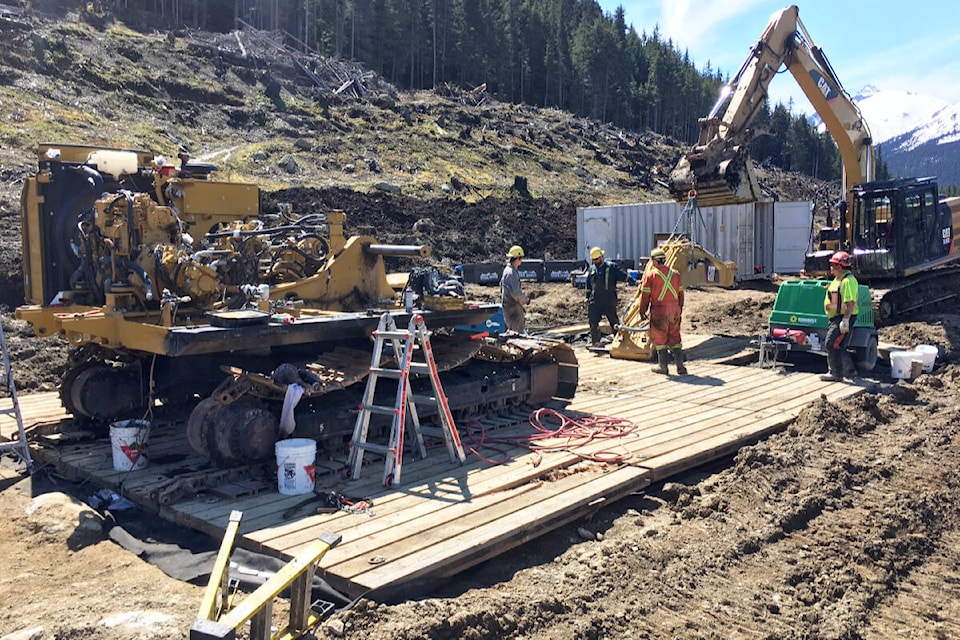Business
B.C. Supreme Court to Review Major Legal Challenge to KSM Gold Mine

A significant legal challenge regarding one of the world’s largest untapped gold deposits is set to unfold in the British Columbia Supreme Court later this month. The case revolves around the KSM project, developed by Seabridge Gold Inc., which claims to be Canada’s largest gold mine project, with estimated reserves of 47.3 million ounces of gold and 7.3 billion pounds of copper. The hearing is scheduled from September 22 to October 1, 2024, and will examine the decision by the B.C. Environmental Assessment Office (EAO) to grant the project a Substantially Started Designation (SSD).
The KSM project is located near Stewart in British Columbia’s northwest region. The SSD, granted on July 29, 2024, indicates that the project’s Environmental Assessment Certificate will not expire, even if it fails to make a substantial start within the mandated timeframe. This designation is critical as it allows the project to proceed without undergoing a fresh environmental review under current laws and conditions.
In response to the EAO’s decision, several groups filed petitions challenging the SSD. These include the Tsetsaut Skii km Lax Ha Nation, the SkeenaWild Conservation Trust, and the Southeast Alaska Indigenous Transboundary Commission. The petitioners argue that the provincial government did not adequately consult with affected communities before issuing the SSD.
According to Rudi Fronk, CEO of Seabridge Gold, the company maintains that its legal arguments against the allegations presented in the petitions are robust. “I continue to have confidence in the strength of our position against the Petitions and hope for a speedy decision by the Court,” Fronk stated. He emphasized that while the legal process is ongoing, the SSD remains in effect.
Seabridge’s latest submissions build upon earlier arguments made in May, asserting that the EAO followed a fair process, fulfilled its consultation obligations, and made a sound decision in granting the SSD. Additionally, the company is questioning the legal standing of the SkeenaWild Conservation Trust, seeking the court’s dismissal of its petition.
The B.C. government has also filed its written arguments supporting Seabridge’s position. Meanwhile, the Southeast Alaska Indigenous Transboundary Commission, one of the original petitioners, has recently withdrawn from the case. A spokesperson clarified that this withdrawal was a procedural decision aimed at concentrating on another case deemed more strategically important to Tribal rights. “It is not based on the merits of the judicial review, and we remain confident in its chances of success,” the spokesperson added.
The upcoming court proceedings will provide a platform for all remaining parties to present their arguments. The outcome will have significant implications not only for the KSM project but also for the broader discourse on environmental assessment and Indigenous consultation in British Columbia.
-

 Education2 months ago
Education2 months agoBrandon University’s Failed $5 Million Project Sparks Oversight Review
-

 Lifestyle3 months ago
Lifestyle3 months agoWinnipeg Celebrates Culinary Creativity During Le Burger Week 2025
-

 Science3 months ago
Science3 months agoMicrosoft Confirms U.S. Law Overrules Canadian Data Sovereignty
-

 Health3 months ago
Health3 months agoMontreal’s Groupe Marcelle Leads Canadian Cosmetic Industry Growth
-

 Science3 months ago
Science3 months agoTech Innovator Amandipp Singh Transforms Hiring for Disabled
-

 Technology3 months ago
Technology3 months agoDragon Ball: Sparking! Zero Launching on Switch and Switch 2 This November
-

 Education3 months ago
Education3 months agoRed River College Launches New Programs to Address Industry Needs
-

 Technology3 months ago
Technology3 months agoGoogle Pixel 10 Pro Fold Specs Unveiled Ahead of Launch
-

 Technology1 month ago
Technology1 month agoDiscord Faces Serious Security Breach Affecting Millions
-

 Business2 months ago
Business2 months agoRocket Lab Reports Strong Q2 2025 Revenue Growth and Future Plans
-

 Science3 months ago
Science3 months agoChina’s Wukong Spacesuit Sets New Standard for AI in Space
-

 Education3 months ago
Education3 months agoAlberta Teachers’ Strike: Potential Impacts on Students and Families
-

 Technology3 months ago
Technology3 months agoWorld of Warcraft Players Buzz Over 19-Quest Bee Challenge
-

 Business3 months ago
Business3 months agoNew Estimates Reveal ChatGPT-5 Energy Use Could Soar
-

 Business3 months ago
Business3 months agoDawson City Residents Rally Around Buy Canadian Movement
-

 Education3 months ago
Education3 months agoNew SĆIȺNEW̱ SṮEȽIṮḴEȽ Elementary Opens in Langford for 2025/2026 Year
-

 Technology1 month ago
Technology1 month agoHuawei MatePad 12X Redefines Tablet Experience for Professionals
-

 Technology3 months ago
Technology3 months agoFuture Entertainment Launches DDoD with Gameplay Trailer Showcase
-

 Business3 months ago
Business3 months agoBNA Brewing to Open New Bowling Alley in Downtown Penticton
-

 Technology3 months ago
Technology3 months agoInnovative 140W GaN Travel Adapter Combines Power and Convenience
-

 Technology3 months ago
Technology3 months agoGlobal Launch of Ragnarok M: Classic Set for September 3, 2025
-

 Science3 months ago
Science3 months agoXi Labs Innovates with New AI Operating System Set for 2025 Launch
-

 Technology3 months ago
Technology3 months agoNew IDR01 Smart Ring Offers Advanced Sports Tracking for $169
-

 Technology3 months ago
Technology3 months agoDiscover the Relaxing Charm of Tiny Bookshop: A Cozy Gaming Escape










